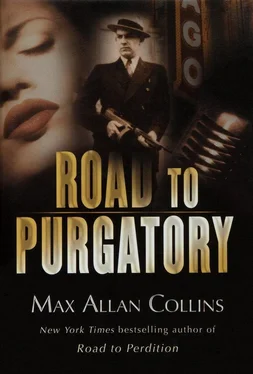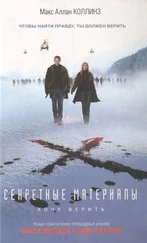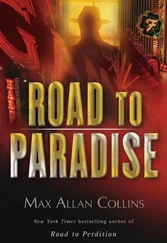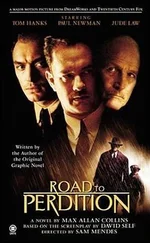Michael Satariano — Michael O’Sullivan, Jr. — was a soldier. He could no longer fight the Japanese or the Germans; but he could do his country — and the memory of his dead father, brother, and mother — the service of removing from the face of the earth the blight of Alphonse “Scarface” Capone. Who even now, from a distance, ruled the Chicago Outfit, barely having to lift his pudgy fingers.
Little of the mansion was visible from the road, thanks to an eight-foot concrete-block wall. Michael pulled in at the spiked-iron gate before heavy oak portals. No guard met him, but, using a house phone on a stucco pillar, he announced himself while still in the Packard, receiving no acknowledgment. He was just starting to think that the phone was dead when a slot in one oak door slid open, speakeasy-style, and dark eyes under bushy dark eyebrows gave him the once-over.
The portals swung open, and then the gate, courtesy of a tall, solidly built guard in white slacks and a white short-sleeve shirt, cut by the dark brown of a shoulder holster. Michael waved at the deeply tanned guard and received a nod for his trouble; the Packard headed down the graveled drive, the doors and gate closing behind him.
To his right was that white concrete wall, to his left an elaborate rock garden; ahead the gravel drive ducked under the archway of a mission-style gatehouse, to curve around to the looming mansion itself. Perhaps a dozen palms surrounded and shaded the impressive beige two-story neo-Spanish stucco structure; the arched windows wore green-and-brown-striped canvas awnings, the flat tile roof also green.
A castle fit for a king — in this case, King Capone.
Michael pulled up into the area where the gravel drive widened to accommodate parking, though only one other vehicle was present, a 1941 aquamarine Pontiac. As Michael got out, a slender dark-haired man in a white suit mirroring his own came out the front door, followed by a colored servant in a black vest and white shirt and dark trousers.
Holding out his hand, the man spoke in a slightly squeaky tenor: “Sergeant Satariano, a delight, an honor, sir... I’m John Capone, but my pals call me Mimi.”
Michael’s host had an oblong, pleasant face that seemed a more handsome if less forceful version of his famous brother’s. His white shirt was open at the neck (Michael had worn a light blue tie).
“Thank you, Mr. Capone,” Michael said, shaking hands with Big Al’s younger brother, whose grasp was mild despite much enthusiastic arm pumping.
“Make it Mimi, please. This is Brownie, our houseboy — he’ll get your bag.”
Michael nodded to the “boy,” who was about forty. Brownie nodded and smiled back.
Mimi slipped an arm around Michael’s shoulder and walked him to the side of the house. “Michael... is it Michael or Mike?”
“Either.”
“Mike, Frank Nitti has nothing but good things to say about you. I was thrilled to get to meet you, and I know Mae feels the same. Medal of Honor! Damn! And you haven’t forgotten your Sicilian roots, good for you!... I think Sonny’s coming over tomorrow to shake your hand, too.”
“Sonny?”
“Al’s son. He’s about your age. He’s a mechanic over at the Miami Air Depot — tried to get in the army, but he’s got a bum ear.”
As they strolled along the side of the house — a paved walk and mosaic patios edged it — Michael noted a stocky, swarthy tough in a yellow sport shirt and tan trousers; he wore a shoulder holster with a revolver, and was ambling up and down that side of the mansion. Another guard, again in a sport shirt with shoulder holster, sat on a beach chair on one of the patios, reading Ring magazine. Another guard, next patio down, sat engrossed in Spicy Mystery , a pulp with a naked woman tortured on the cover.
The guards in their casual attire looked like they should be lugging golf clubs on the links, not weapons around the grounds of a gangster’s palace... though the lawn and shrubs were as carefully tended as any country club’s.
Mimi noticed Michael tallying the help and said, “We have five outside, including the gate guard, and two in the house.”
“Day and night?”
“Yeah, three shifts. Usually we only have four on the grounds, but ’cause of Frank’s concern, I canceled days off. Beefing up, a little.”
“Good to hear. Good-size staff.”
“Twenty-one guys, all from Chicago. Know their stuff.”
Maybe, but every guard was in his midthirties or older; in the Outfit, Michael knew, if you hadn’t made a mark by your early thirties, you weren’t going anywhere. King Capone or not, these were not the first team.
Not that that made them pushovers or any less deadly than any thug with a gun.
And there were a lot of them, with — as Mimi Capone explained — half a dozen living on site, in the gatehouse as well as a two-story Moorish-style cabana, just beyond the endless backyard swimming pool.
“Would you mind pointing out Mr. Capone’s room, Mimi?”
“Not at all, Mike — that’s it right there.”
The younger Capone indicated a second-floor balcony; underneath, on the first floor, was one of those arched windows with its striped awning.
“First floor awning’s got to go,” Michael said.
“Pardon?”
“Second floor don’t matter, but take a look at this.”
Michael walked over and demonstrated how he could step on the first-floor window ledge, and hoist himself up on the metal framework of the awning, giving him easy access to Al Capone’s balcony.
“Jeez, Mike — I see what you mean.”
Michael dusted off his hands as he and Mimi began to walk again. “I want those awnings taken down tomorrow morning, before Mr. Nitti arrives. Okay, Mimi?”
“Not a problem. Of course, Mae won’t love it...”
Mimi was a gracious, talkative host, who pointed out all the sights, from a rock pool with tropical fish (Al liked to feed them bread crumbs) and the dock on the north side, which was home to a cabin cruiser (the Arrow ) and a speedboat (christened Sonny ). No cement wall encumbered the dockside view of Biscayne Bay — white sunlight careening off white sails, powerboats cutting abstract designs in the blue expanse with their wakes.
Mimi sat Michael down by the pool on one of several deck chairs and went into the cabana to fetch refreshment.
Handing a moisture-sweating bottle of Coke to Michael, a grinning Mimi said, “Frank said you don’t drink. He respects that. Me, frankly... I think that’s plain nuts.”
And then Mimi laughed, so Michael laughed, too.
“Beer for me all the way,” Mimi said. “Been good to our family... Hey, you know who built this villa? Whose money, I mean, back in the early ’20s?”
“No idea.”
“Clarence M. Busch of St. Louie!”
“The brewer?”
“None other. When Prohibition came in, one beer baron on hard times had to sell out to another one, on the rise! Ain’t life funny?”
“Hilarious,” Michael said.
The two men sat there for fifteen minutes, talking, or anyway Mimi talked and Michael listened; the view of the bay stretched out before them, a soothing presence.
“I have the feeling,” Mimi said carefully, “that Frank may doubt the loyalty of some of our boys.”
“He didn’t say so,” Michael lied.
Mimi swigged his beer. “Well, we always keep a tight lid on, when Al and Frank get together. Hell, even I won’t be around.”
“Oh?”
“Less I know about what’s really goin’ on, happier I am.”
“Don’t you live here, Mimi?”
“Actually, no. I got a place down the road.”
“Who does, besides half a dozen of your guards?”
Mimi ticked off fingers. “Mae and her sister Muriel, and Muriel’s husband, Louis. Muriel and Louis already skedaddled — went for a few days’ vacation to Fort Lauderdale. Brownie lives off premises; so does Rose, our maid.”
Читать дальше












